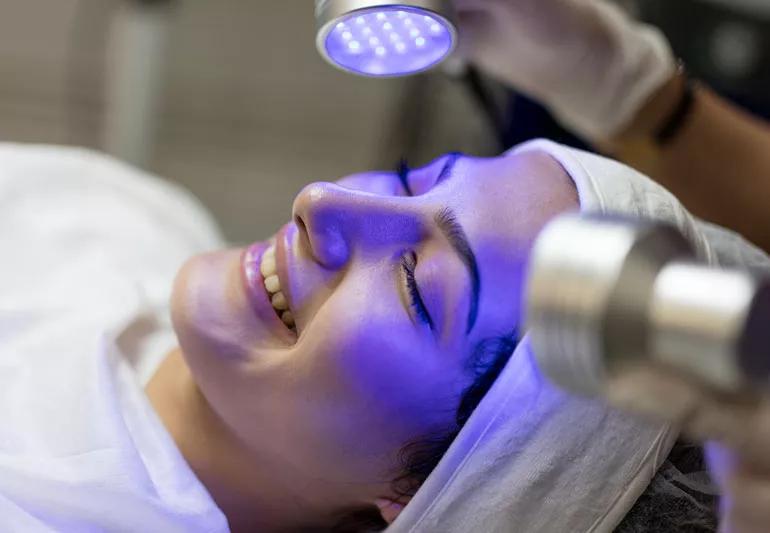Go blue to treat acne, sun damage and skin cancer

Image content: This image is available to view online.
View image online (https://assets.clevelandclinic.org/transform/a96560d9-274a-4d75-895f-8f664871d0f2/blueLightDerm-1268437501_770x533_jpg)
Blue light for your health
Blue light from electronic devices gets a bad rap for straining eyes and disrupting sleep. But this natural wavelength of light isn’t all bad.
Advertisement
Cleveland Clinic is a non-profit academic medical center. Advertising on our site helps support our mission. We do not endorse non-Cleveland Clinic products or services. Policy
Blue light therapy can help clear up acne and treat sun damage and non-melanoma skin cancers. Dermatologist Paul X. Benedetto, MD, explains how it works and who can benefit from feeling blue.
Blue light treatment is most often used as part of a treatment called photodynamic therapy. This therapy can treat some kinds of skin cancer and precancerous spots known as actinic keratoses. These reddish, scaly patches are caused by severe sun damage. Over time, they can turn into squamous cell carcinoma, a type of skin cancer.
To treat cancerous or precancerous spots with phototherapy, a dermatologist first applies a photosensitizing medication to your skin. “That makes the treated area sensitive to damage by the light,” Dr. Benedetto explains.
After letting the drug soak into your skin for an hour or two, the dermatologist shines blue light onto the treated skin for about 15 minutes. The light kills the cells that absorbed the sensitizing medication. Following the treatment, the damaged skin flakes off, leaving healthier, younger-looking skin behind.
For the best results, Dr. Benedetto says you’ll probably need to repeat the treatment two or three times, about four to six weeks apart.
“Photodynamic therapy can be really helpful for treating people who have a lot of sun damage or pre-cancers. Besides reducing the chances of developing skin cancer, it improves the appearance of the skin,” he adds.
Advertisement
Blue light can also spell lights out for some types of acne. Many cases of common acne are caused by a bacterium called Propionibacterium acnes, or P. acnes, which lives on your skin. And P. acnes just so happens to emit its own photosensitizer, which makes it sensitive to blue wavelengths of light.
Shining blue light onto acne-prone skin can kill the bacteria and clear up blemishes. But it’s not magic.
Blue light therapy doesn’t work for everyone, and it might take several sessions to find out if your acne is sensitive to blue light. If it is, you might still need to use other acne treatments, like prescription creams. But for some people, the treatment can light the way to clearer skin.
It’s possible to buy blue light devices to treat acne at home. But they may not be worth the investment. “I’d recommend having a dermatologist do it,” Dr. Benedetto says.
And because not everyone’s acne responds to blue light, purchasing a device might be a waste of time and money. Dermatologists can steer you toward the acne treatments that are most likely to work for you. If blue light is a good option, the devices in the doctor’s office are more powerful than those you can buy for at-home use.
Blue light therapy is safe for most people, though it isn’t recommended for people with photosensitivity disorders (diseases that cause sensitivity to the sun).
When they’re used to treat acne, blue light treatments have few side effects, though some people might notice redness or dry skin.
However, blue light does have some side effects when it’s used with a photosensitizer as part of photodynamic therapy for skin cancer or sun damage:
For patients with many years of sun damage, blue light can be a great tool for reducing skin cancer risk and improving the look of your skin — and that should leave you feeling anything but blue.
Advertisement

Sign up for our Health Essentials emails for expert guidance on nutrition, fitness, sleep, skin care and more.
Learn more about our editorial process.
Advertisement
Eczema triggers are different for everyone, but there are some common ways to manage flare-ups, like using a humidifier and fragrance-free creams
Over-the-counter antifungal creams usually get the job done, but it’s important to keep it from spreading in the meantime
Although it could be used as a moisturizer, this new trend is not recommended
The popular skin care ingredient can help smooth, brighten and strengthen your skin
It’s a great disinfectant for around your home, but not for your skin
Changes in texture, smell, color and performance are signs it’s time to throw the cosmetic item away
Follow the 4Cs — cooling, cleaning, covering and comforting — to start the healing process
Bathing once a day is the general guidance, but you could also have reasons to soap up twice a day or not at all
Prioritize your health by managing stress, strengthening your social connections and getting quality sleep
Bolsters, blankets, pillows and blocks can offer extra support, stability and comfort
Allergies, postnasal drip, asthma or reflux could be to blame for a cough that won’t quit